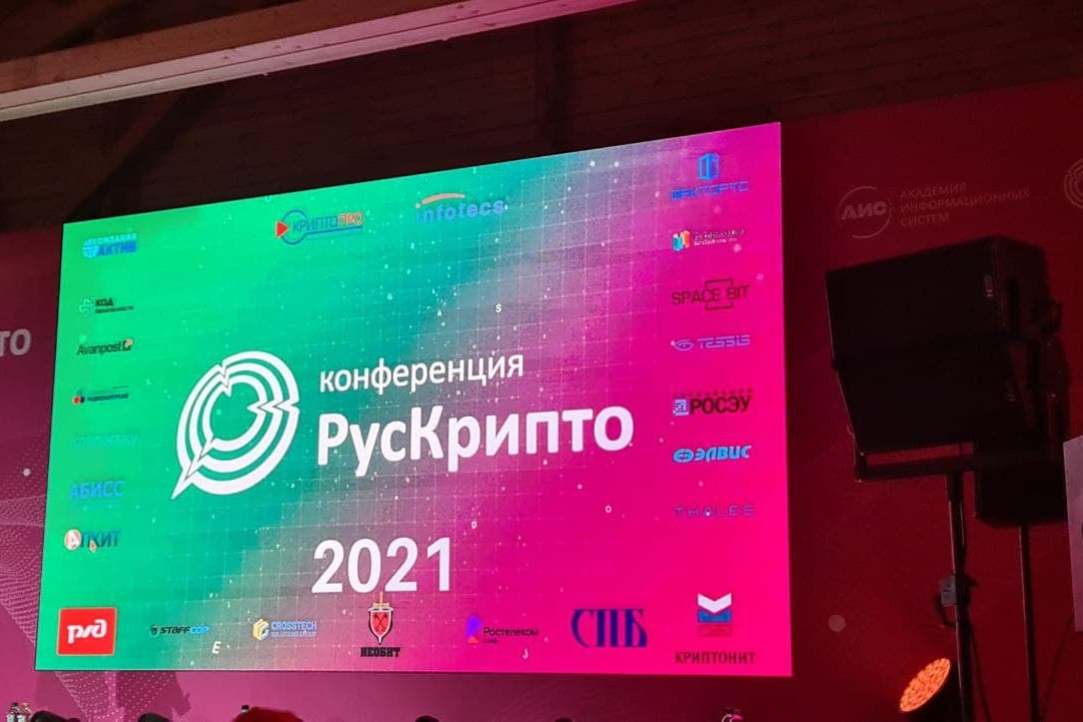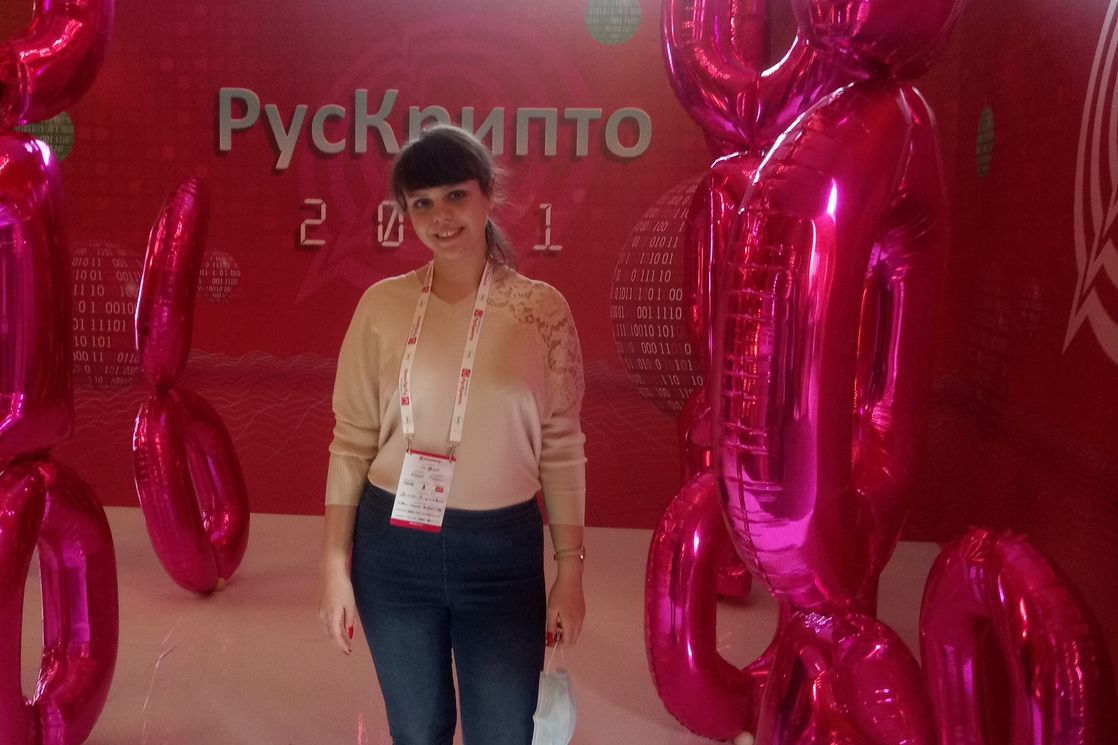In Plain Text: HSE MIEM Doctoral Student Wins a RusCrypto Competition

At the 2021 RusCrypto Competition, HSE PhD student Anastasia Malashina (MIEM) won the student report category by the unanimous decision of the competition committee, which included the directors of the RusCrypto-2021 Association, members of the programme committee, and experts in the field of computer security. Anastasia spoke with HSE News Service about her presentation.
Anastasia Malashina’s study, ‘An Algorithm for Recovering Individual Parts of Text Messages from Information about Possible Variants of its Signs’ grew out of her research work, which she began during her undergraduate studies in Cyber Security under the supervision of Professor Alexey Los. After graduation, she entered the Doctoral School of Engineering Science where she specializes in Cyber Security and continues to work with her supervisor.
Anastasia Malashina, PhD student, Doctoral School of Engineering Science, MIEM, HSE University

My research touches upon questions of classical cryptography little known in wide circles. I study the possibility of keyless recovery of individual parts of messages encrypted with a stream cipher.
Keyless recovery means that the plaintext is recovered from the encrypted text using certain auxiliary information about this text. In this case, the definition of the encryption key is not required.
Typically, messages are transmitted over the communication channel in encrypted form. If a stream cipher is used with the correct key and no side channel leaks occur, it is often impossible to recover the original message without knowing the key. But in practice, a number of situations are often possible when information about the variants of some symbols of the original message becomes known. For example, in cases of incorrect selection of the key sequence, there can be leakage through side communication channels, or there may be repeated use of the same encryption key for different texts. In this case, it is possible to build an algorithm that allows you to restore individual segments of the message text.
I am researching an algorithm for recovering individual segments of the text, its efficiency and laboriousness for various initial parameters, and the possibility of applying it in practice.
The results of the study of this method can be used to assess the security of certain information systems. It is of particular value due to the need to develop methods of analysis and synthesis of modern algorithms for protecting information
The RusCrypto Conference, which was held March 23–26, is the central event of the year in the field of cryptography. The event gives students and graduate students the opportunity to present their work to a court of top professional information security specialists. Presentations are selected by a competition jury, which includes the directors of the RusCrypto Association and technical experts from companies participating in the association. I was named the winner of this year’s report competition, which was a big surprise for me.
I was given the opportunity to present my report at the panel, ‘Cryptography and Cryptanalysis’, and all expenses (the registration fee, accommodation, and meals) for me as the winner were covered by the organizers.
I did not specifically prepare for the competition, I simply presented all the results of my research, which I obtained over the past year and a half of my doctoral studies, in the form of a single work.
A huge plus for me was that the organizers did not set a word limit for the text of the report, as is often the case in such competitions. Therefore, I was not limited to any formal framework and was able to outline all aspects and results of my work.
I am not sure that in the future my field of activity will be limited only to the scientific sphere, but in any case, I plan to continue my academic work — teaching and research. Now at MIEM I am in charge of a third-year student project that deals with the information properties of language. The project has already won the cyber security section at the Annual Interuniversity Scientific and Technical Conference for Students, Postgraduates, and Young Specialists named after E.V. Armensky.
See also:
Doctoral Student Explores the Challenges Faced by International PhD Seekers During the Pandemic
In late June 2024, a pre-defence of Nurudeen Abdul-Rahaman’s dissertation took place at the HSE Institute of Education. Nurudeen Abdul-Rahaman, a doctoral student from Ghana, has presented his dissertation ‘Academic and Social Integration of Foreign Doctoral Students at Russian Universities during the Covid-19 Pandemic’ for the degree of Candidate of Sciences in Education (PhD).The HSE News Service spoke with Nurudeen as well as his academic supervisor, Evgeniy Terentev, Director of the Institute of Education, about their extensive research on international doctoral students in Russia and Nurudeen's contribution to this research.
‘We Cannot Understand the Modern Ideological Confrontation without the Accusations that Emerged during the Lausanne Process’
Rainer Matos Franco, from Mexico, defended his PhD thesis with honours at HSE University this June. In his dissertation, Rainer Matos Franco examines the history of anticommunism in Europe during the 1920s. The HSE News Service spoke with Rainer and his academic supervisor, Tatiana Borisova, about the significance of the Lausanne Process for the Cold War and contemporary history, the opportunities provided by HSE University for international PhD candidates, and the challenges of working with a vast database of historical sources.
‘I Am Able to Tell My Students Things That I Always Wanted to Tell People in Russia’
Ana Livia Araujo Esteves, from Sao Paulo, Brazil, is a journalist, a third-year doctoral student of International Relations, and visiting lecturer at the HSE School of International Regional Studies. In her interview for the HSE News Service, she speaks about her motivation to carry out research and teach students in Russia, shares some tips for people from Latin America living in Moscow, and talks about why a dog can be a reason to stay in Russia for just a bit longer.
Zaruhi Hakobyan Shortlisted for HSE Alumni Awards
Zaruhi Hakobyan, master’s graduate of the HSE University Faculty of Economic Sciences and research scientist at the University of Luxembourg, is involved not only in research but also in organising academic events for young scientists and students. As a foreign graduate of HSE University, Zaruhi was nominated for the HSE Alumni Awards ‘for her tireless enthusiasm in popularising economic science, teaching, and research at the international level’ and made the shortlist.
‘Studying at HSE Was a Chance for Me to Get to Know Some Supportive Seniors, Knowledgeable Professors, and Wonderful Friends’
On August 4, 2023, a pre-defence of the thesis on ‘Refugee-Host Community Conflict over Assimilation, Integration, and State Legitimacy: The Case of Rohingyas in Bangladesh’ by Md. Reza Habib will be held at HSE University. The preliminary defence will take place at a joint meeting of the HSE School of Sociology and the International Laboratory for Social Integration Research. Md. Reza Habib shared his experience of studying and preparing his PhD with the HSE News Service.
‘At HSE University, We Receive Substantial Support for Our Research’
Wenrui Zhang, from China, is a recent graduate of theMaster’s in Economics and Economic Policy at the HSE UniversityFaculty of Economic Sciences. Having successfully defended his master’s thesis on the impact of COVID-19 on the incomes of vulnerable groups, Wenrui has set his sights on publishing his research and enrolling in adoctoral programme at the university. The HSE News Service interviewed Wenrui about his achievements so far and his goals for the future, and also spoke to Prof.Elena Kotyrlo, his academic supervisor.
‘I Hope to Make Meaningful Contributions to the Academic Community’
Why do international students at HSE University decide to pursue a career in academia? What fields in economics are relevant to PhD students? Richard Asiamah from Ghana and Alesya Bukreeva from Uzbekistan are current master’s students at the Faculty of Economic Sciences, but have already received scholarships from the faculty to continue their studies as doctoral students at the university. Below, they share their experiences, while Denis Melnik, Academic Director of the Doctoral School of Economics, suggests some tips for the application process.
1,700 International Participants Named Winners of Open Doors International Olympiad
On March 16, the results of the Open Doors International Olympiad for master’s and doctoral applicants were announced. The competition is organised by the Association of Global Universities with the support of the Ministry of Education and Science of Russia and the Federal Agency for the Commonwealth of Independent States Affairs, Compatriots Living Abroad, and International Humanitarian Cooperation (Rossotrudnichestvo). HSE University is one of the Olympiad’s organisers and the site of its distributed project office.
‘My PhD Taught Me about Life, Professionalism, Research, and Controlling My Emotions’
Wai Yan Phyo Naing first came to HSE University from Myanmar to enrol in a master’s programme at the Faculty of World Economy and World Affairs in 2015. After graduation, he decided to pursue a PhD at the Doctoral School of International and Regional Studies. On February 16, 2023, he successfully defended his dissertation on ‘Evolution of Myanmar’s Policy Towards China (1988–2020)’.
‘Working in Academia Is My Lifelong Desire’
Majid Sohrabi is a 28 year-old student from Iran currently enrolled in a doctoral programme at the HSE University Faculty of Computer Science. Before starting his PhD, he graduated with honours from the university’s Master of Data Science programme. In addition to studying, he also works as an assistant at the School of Data Analysis and Artificial Intelligence and a research assistant at the Laboratory for Models and Methods of Computational Pragmatics.


